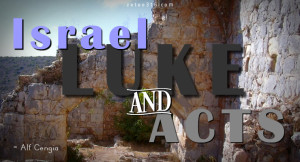
Israel, Luke and Acts. Did the disciples misunderstand the meaning of the restoration of Israel in Acts 1:6-7?
I once listened to an interesting radio discussion between Wheaton College’s Gary Burge and Moody Bible Institute’s Michael Rydelnik. Burge wanted to avoid any references to the Old Testament. The reason is that the OT contains a multitude of promises about Israel’s restoration. Burge thinks national Israel is out of covenant with God because it “oppresses” Palestinians. He has been actively recruiting young evangelicals to become pro-Palestinian via guided tours to the region and his involvement with CATC and Bethlehem Bible College.
Burge informed Rydelnik that we should think “Christianly” and stick to the New Testament. We’ve discussed the topic of the NT reinterpreting the OT before. Theologians like Burge trust that the NT reassigns Israel’s promises and expands (read transfers) them to the church. In fact the NT reaffirms these OT promises to Israel in passages such as Acts 1:6-7.
Therefore, when they had come together, they asked Him, saying, “Lord, will You at this time restore the kingdom to Israel?” And He said to them, “It is not for you to know times or seasons which the Father has put in His own authority. Act 1:6-7
In his polemical book Christian Zionism Road-map to Armageddon? (p 169) Stephen Sizer (a colleague of Burge) attempts to reinterpret these verses by citing John Calvin. Calvin wrote that there are as many mistakes in this question (v 6) as there are words.
One response used by amillennial proponents of Replacement Theology (as Calvin was) is that the pre-Pentecost disciples asked the question out of ignorance. After Pentecost they allegedly put aside any thought of a kingdom restoration to Israel. Sizer cites verse 8 as if that seals this case.
In his book Jesus and the Holy City Peter Walker does his best to skirt around these passages in order to evade the plain sense (pp 95-97). He redefines the restoration of the kingdom to Israel so that it no longer points to a “restoration” but a transferal and modification. Walker writes:
There was no point in waiting for the repentance of ethnic Israel before evangelizing the Gentiles because (contrary to appearances) the ‘restoration’ of Israel had already occurred – principally in Jesus’ death and resurrection, but also in the number of Jewish people (however small) who had turned to their Messiah. Israel’s restoration was present reality.
This is pure sleight of hand. If the restoration was a present reality then Jesus’ response regarding the timing of a future restoration (v7) doesn’t make sense, and neither does Rom 11:25-29.
Was the disciples’ question really a mistake? Did they ask it from a position of ignorance? The biblical evidence doesn’t warrant this premise. These arguments force onto the texts something which isn’t there. They are used to preserve a doctrinal tradition. Note the following:
1) In Luke 24:44-45 Jesus expected the disciples to understand what the Law of Moses, the Prophets and the Psalms literally spoke of Him (see also Luke 24:25-27).
2) The Lord opened their understanding so that they could comprehend the Scriptures.
3) These Scriptures were the Old Testament.
4) This was prior to Pentecost and prior to their question regarding the kingdom. Luke records in Acts 1:1-3 that Christ spent forty days with the disciples talking to them about the kingdom.
5) The Lord’s response affirms the legitimacy of their expectation by not denying it. Jesus didn’t correct the disciples as He always did in the past. Instead, He told them that it was not for them to know the time of this restoration.
In the interim Jesus had work for them to do (Acts 1:8). As Michael Vlach notes:
…Jesus tells the apostles what they were to focus on—“but you will receive power when the Holy Spirit has come upon you; and you shall be My witnesses both in Jerusalem, and in all Judea and Samaria, and even to the remotest part of the earth” (1:8). Some have taken this answer to mean that Jesus was redirecting the expectation of the apostles, but this is not the case. Jesus tells them that the timing of the restoration of the kingdom to Israel will take place on the Father’s timetable, but what the apostles needed to focus upon now was being a witness for Jesus. In other words, “The kingdom will be restored to Israel when the Father is ready to do so, but for now you are to focus on being My witnesses to the world.”
A literal “Christianly” NT view of Scripture actually affirms the eventual restoration of national Israel. Not the other way around.
